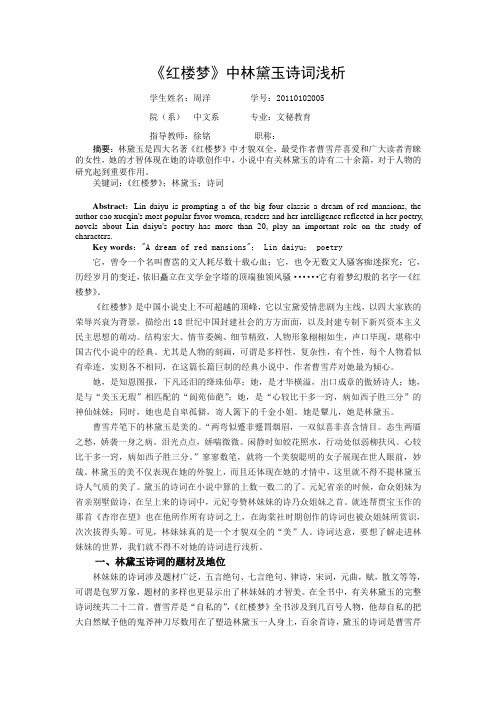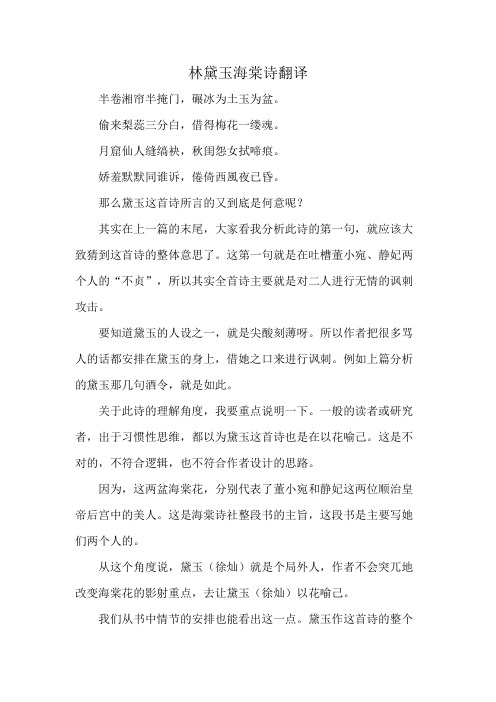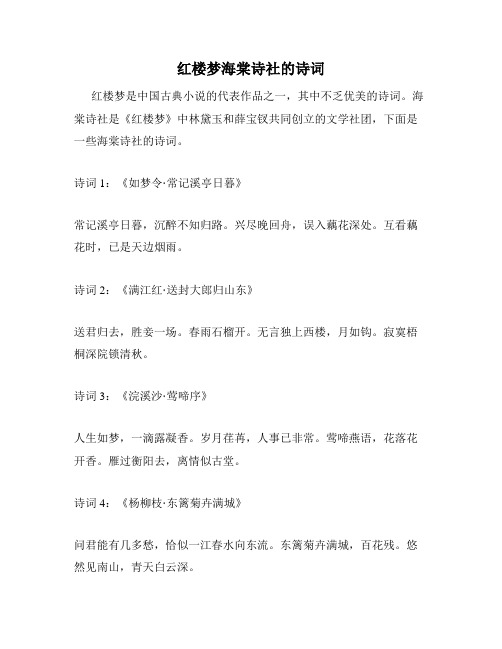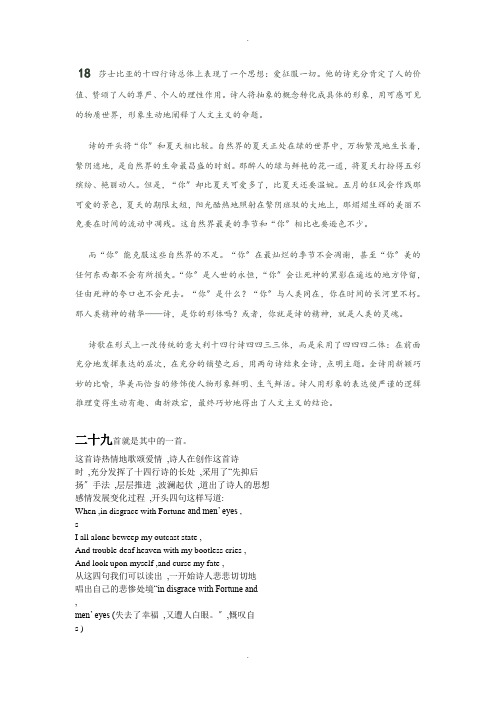林黛玉海棠诗的绝佳英文翻译
《红楼梦》中林黛玉诗词浅析

《红楼梦》中林黛玉诗词浅析学生姓名:周洋学号:20110102005院(系)中文系专业:文秘教育指导教师:徐铭职称:摘要:林黛玉是四大名著《红楼梦》中才貌双全,最受作者曹雪芹喜爱和广大读者青睐的女性,她的才智体现在她的诗歌创作中,小说中有关林黛玉的诗有二十余篇,对于人物的研究起到重要作用。
关键词:《红楼梦》;林黛玉;诗词Abstract:Lin daiyu is prompting a of the big four classic a dream of red mansions, the author cao xueqin's most popular favor women, readers and her intelligence reflected in her poetry, novels about Lin daiyu's poetry has more than 20, play an important role on the study of characters.Key words:"A dream of red mansions"; Lin daiyu; poetry它,曾令一个名叫曹霑的文人耗尽数十载心血;它,也令无数文人骚客痴迷探究;它,历经岁月的变迁,依旧矗立在文学金字塔的顶端独领风骚······它有着梦幻般的名字—《红楼梦》。
《红楼梦》是中国小说史上不可超越的顶峰,它以宝黛爱情悲剧为主线,以四大家族的荣辱兴衰为背景,描绘出18世纪中国封建社会的方方面面,以及封建专制下新兴资本主义民主思想的萌动。
结构宏大、情节委婉、细节精致,人物形象栩栩如生,声口毕现,堪称中国古代小说中的经典。
尤其是人物的刻画,可谓是多样性,复杂性,有个性,每个人物看似有牵连,实则各不相同,在这篇长篇巨制的经典小说中,作者曹雪芹对她最为倾心。
林黛玉海棠诗翻译

林黛玉海棠诗翻译半卷湘帘半掩门,碾冰为土玉为盆。
偷来梨蕊三分白,借得梅花一缕魂。
月窟仙人缝缟袂,秋闺怨女拭啼痕。
娇羞默默同谁诉,倦倚西風夜已昏。
那么黛玉这首诗所言的又到底是何意呢?其实在上一篇的末尾,大家看我分析此诗的第一句,就应该大致猜到这首诗的整体意思了。
这第一句就是在吐槽董小宛、静妃两个人的“不贞”,所以其实全首诗主要就是对二人进行无情的讽刺攻击。
要知道黛玉的人设之一,就是尖酸刻薄呀。
所以作者把很多骂人的话都安排在黛玉的身上,借她之口来进行讽刺。
例如上篇分析的黛玉那几句酒令,就是如此。
关于此诗的理解角度,我要重点说明一下。
一般的读者或研究者,出于习惯性思维,都以为黛玉这首诗也是在以花喻己。
这是不对的,不符合逻辑,也不符合作者设计的思路。
因为,这两盆海棠花,分别代表了董小宛和静妃这两位顺治皇帝后宫中的美人。
这是海棠诗社整段书的主旨,这段书是主要写她们两个人的。
从这个角度说,黛玉(徐灿)就是个局外人,作者不会突兀地改变海棠花的影射重点,去让黛玉(徐灿)以花喻己。
我们从书中情节的安排也能看出这一点。
黛玉作这首诗的整个过程,是一直远离众人的。
她看花,是从房外看进房内,隔着半卷的湘帘和半掩的门,看到房里的两盆海棠花。
所以她第一句就先表明了这一点,也就是脂批说的“且不说花,且说看花的人”。
然后大家再看书中的描写:独黛玉或抚梧桐,或看秋色,或又和丫鬟们嘲笑……黛玉一开始就是独自一个人在外面院子里。
然后下面一段:宝玉背着手,在回廊上踱来踱去,因向黛玉说道:“你听,他们都有了。
”黛玉道:“你别管我。
”宝玉又见宝钗已誊写出来,因说道:“了不得!香只剩了一寸了,我才有了四句。
”又向黛玉道:“香就完了,只管蹲在那潮地下作什么?”黛玉也不理。
宝玉是在回廊上向院子中“蹲在那潮地下”的黛玉说话。
为何这里特别提到黛玉“蹲在那潮地下”?因为这不就是特意呼应“龄官画蔷”吗?龄官就是蹲在花园的潮地上的。
所以这也证明了龄官的确也是影射董小宛。
葬花吟英文赏析

葬花吟英文赏析《葬花吟》是清代文学家曹雪芹的小说《红楼梦》中女主人公林黛玉吟诵的一首诗。
这首诗通过描绘花儿的凋谢,表达了林黛玉对自身命运的无奈和感叹。
以下是对这首诗的英文赏析:"The Dirge of Flowers" is a poem recited by the female protagonist Lin Daiyu in the novel "Dream of the Red Mansions" written by the Qing Dynasty writer Cao Xueqin. This poem depicts the withering of flowers and expresses Lin Daiyu's helplessness and sigh over her own fate.The poem opens with a description of the soft strings of a spring pavilion and the light touch of cotton-wool on embroidered curtains. This image immediately sets the scene for a poignant tale of a girl's deep feelings of springtime regret."The daughter of the boudoir grieves over the passing of spring, her melancholy heart unable to find release." The first lines are profoundly poignant, as they capture the essence of a girl's heartache over the fleeting beauty of spring. Her solitude andsadness are further emphasized as she "holds the flower hoe in her hand, stepping out of the embroidered curtain, braving the fallen flowers to come and go."The imagery in this section is particularly haunting, as it paints a picture of a girl standing alone, tears streaming down her face as she tenderly tends to the flowers that have begun to wilt. The blood-like stains on the empty branches are a powerful symbol of her emotional anguish.The poem's tone becomes increasingly desolate as it progresses. "The cuckoo was silent at dusk, and she returned with the hoe, closing the heavy door." The cold light of the oil lamp reflects off the white walls, and the icy rain beats against the unheated bedding. The stark loneliness and desolation that surrounds her is a stark contrast to the vibrant life that she once knew.The question "Why do I grieve so deeply?" expresses her tormented thoughts, her emotional upheaval stemming from both her love for spring and her loathing for its inevitable departure. Her deep longing for a time when happiness was hers, and her despair at its loss, arepoignantly expressed through the symbolism of flowers. "The flower and bird spirits cannot be retained, as the birds remain silent and the flowers shrink in shame." She prays that she might be given wings to follow the flowers as they scatter in the wind, far away from this world.However, she knows that even in the boundless sky, there is no resting place for flowers that have lost their way. It is not better to be collected in a brocade purse and hidden from sight, for that would still be a fate worse than death. Her final realization is one of profound sadness; that in a world where flowers cannot find their way, neither can she.The poem's final lines are perhaps its most powerful. "If I had my way, I would rise and float with the flowers, far away from this world." This line sums up her unwavering spirit, her refusal to submit to a fate that does not allow her to be who she truly is. She is not resigned to a life where her spirit is suffocated and her dreams are shattered. Her refusal to accept this fate is a testament to her unwavering will and determination."Dirge of Flowers" is more than just a poem about flowers; it is a profound exploration of human emotion and longing. It is a heartfelt cry from one who has seen what happiness once was and now faces a future that seems bleak and devoid of hope. It is a refusal to accept a world that does not value the individual, a world that does not see the beauty and worth in each unique soul. It is a testament to the resilience of the human spirit in the face of seemingly insurmountable obstacles.。
红楼梦《好了歌》英译

红楼梦《好了歌》英译好了歌世人都晓神仙好,唯有功名忘不了!古今将相在何方?荒冢一堆草没了。
世人都晓神仙好,只有金银忘不了!终朝只恨聚无多,及到多时眼闭了。
世人都晓神仙好,只有姣妻忘不了!君生日日说恩情,君死又随人去了。
世人都晓神仙好,只有儿孙忘不了!痴心父母古来多,孝顺儿女谁见了?大卫.霍克斯英文翻译版本Men all know that salvation should be won,But with ambition won't have done, have done. Where are the famous ones of days gone by?In grassy graves they lie now, every one.Men all know that salvation should be won,But with their riches won't have done, have done. Each day they grumble they've not made enough, When they've enough, it's goodnight everyone. Men all know salvation should be won,But with their loving wives they won't have done. The darlings every day protest their love;But once you're dead, they're off with another one. Men all know that salvation should be won,But with their children won't have done, have done. Yet though of parents fond there is no lack,Of grateful children saw I ne'er a one.杨宪益、戴乃迭翻译版本All men long to be immortals,Yet to riches and rank each aspires;The great ones of old, where are they now? Their graves are a mass of briars.All men long to be immortals,Yet silver and gold they prizeAnd grub for money all their livesTill death seals up their eyes.All men long to be immortalsYet dote on the wives they've wed,Who swear to love their husband evermore But remarry as soon as he's dead.All men long to be immortalsYet with getting sons won't have done. Although fond parents are legion,Who ever saw a really filial son?。
红楼梦海棠诗社的诗词

红楼梦海棠诗社的诗词
红楼梦是中国古典小说的代表作品之一,其中不乏优美的诗词。
海棠诗社是《红楼梦》中林黛玉和薛宝钗共同创立的文学社团,下面是一些海棠诗社的诗词。
诗词1:《如梦令·常记溪亭日暮》
常记溪亭日暮,沉醉不知归路。
兴尽晚回舟,误入藕花深处。
互看藕花时,已是天边烟雨。
诗词2:《满江红·送封大郎归山东》
送君归去,胜妾一场。
春雨石榴开。
无言独上西楼,月如钩。
寂寞梧桐深院锁清秋。
诗词3:《浣溪沙·莺啼序》
人生如梦,一滴露凝香。
岁月荏苒,人事已非常。
莺啼燕语,花落花开香。
雁过衡阳去,离情似古堂。
诗词4:《杨柳枝·东篱菊卉满城》
问君能有几多愁,恰似一江春水向东流。
东篱菊卉满城,百花残。
悠然见南山,青天白云深。
诗词5:《卜算子·咏梅》
春色满园关不住,一枝红杏出墙来。
雨打梨花深闭门,忘了青春,误
了青春。
赏心乐事共谁论?花下销魂,月下销魂。
以上是海棠诗社的一些诗词,这些诗词流畅优美,典雅高贵,悠然自得,令人陶醉。
它们不仅仅是文学作品,更是一种精神的寄托和追求,透过这些诗词,我们能够领略到红楼梦中的诗词风范。
长恨歌中英文对照

长恨歌中英文对照白居易原文长恨歌翻译:许渊冲(诗译英法惟一人)THE EVERLASTING REGRET汉皇重色思倾国,御宇多年求不得。
杨家有女初长成,养在深闺人未识。
The beauty-loving monarch longed year after yearTo find a beautiful lady without peer.A maiden of the Yangs* to womanhood just grown,In inner chambers bred, to the world was unknown.*Yang Yu-huan (719-756) was the favourite mistress of Emperor XuanZong (reigned 725-768) of the Tang Dynasty.天生丽质难自弃,一朝选在君王侧。
回眸一笑百媚生,六宫粉黛无颜色。
Endowed with natural beauty too hard to hide,One day she stood selected for the monarch’s side.Turning her head, she smiled so sweet and full of graceThat she outshone in six palaces the fairest face.春寒赐浴华清池,温泉水滑洗凝脂。
She bathed in glassy water of warm-fountain pool,Which laved and smoothed her creamy skin when spring was cool.侍儿扶起娇无力,始是新承恩泽时。
Upborne by her attendants, she rose too faint to move,And this was when she first received the monarch’s love.云鬓花颜金步摇,芙蓉帐暖度春宵。
英语学习资料:英文版的黛玉葬花吟

英语学习资料:英文版的黛玉葬花吟花谢花飞花满天,红消香断有谁怜?游丝软系飘春榭,落絮轻沾扑绣帘;The blossoms fade and falling fill the air,Of fragrance and bright hues bereft and bare. Floss drifts and flutters round the Maiden`s bower, Or softly strikes against her curtained door.闺中女儿惜春暮,愁绪满怀无释处;手把花锄出绣闺,忍踏落花来复去?The Maid ,grieved by these signs of spring`s decease, Seeking some means her sorrow to express,Has rake in hand into the garden gone,Before the fallen flowers are trampled on.柳丝榆荚自芳菲,不管桃飘与李飞;桃李明年能再发,明年闺中知有谁?Elm-pods and willow-floss are fragrant too;Why care,Maid,where the fallen flowers blew?Next year ,when peach and plum-tree bloom again, Which of your sweet panions will remain?三月香巢已垒成,梁间燕子太无情!明年花发虽可啄,却不道人去梁空巢也倾。
This spring the heartless swallow built his nest Beneath the eaves of mud with flowers pressed. Next year the flowers will blossom as before,But swallow ,nest ,and Maid will be no more.一年三百六十日,风刀霜剑严相逼;明媚鲜妍能几时,一朝飘泊难寻觅。
莎士比亚-sonnet-18-29-66的中文翻译及评析

18莎士比亚的十四行诗总体上表现了一个思想:爱征服一切。
他的诗充分肯定了人的价值、赞颂了人的尊严、个人的理性作用。
诗人将抽象的概念转化成具体的形象,用可感可见的物质世界,形象生动地阐释了人文主义的命题。
诗的开头将“你〞和夏天相比较。
自然界的夏天正处在绿的世界中,万物繁茂地生长着,繁阴遮地,是自然界的生命最昌盛的时刻。
那醉人的绿与鲜艳的花一道,将夏天打扮得五彩缤纷、艳丽动人。
但是,“你〞却比夏天可爱多了,比夏天还要温婉。
五月的狂风会作践那可爱的景色,夏天的期限太短,阳光酷热地照射在繁阴班驳的大地上,那熠熠生辉的美丽不免要在时间的流动中凋残。
这自然界最美的季节和“你〞相比也要逊色不少。
而“你〞能克服这些自然界的不足。
“你〞在最灿烂的季节不会凋谢,甚至“你〞美的任何东西都不会有所损失。
“你〞是人世的永恒,“你〞会让死神的黑影在遥远的地方停留,任由死神的夸口也不会死去。
“你〞是什么?“你〞与人类同在,你在时间的长河里不朽。
那人类精神的精华——诗,是你的形体吗?或者,你就是诗的精神,就是人类的灵魂。
诗歌在形式上一改传统的意大利十四行诗四四三三体,而是采用了四四四二体:在前面充分地发挥表达的层次,在充分的铺垫之后,用两句诗结束全诗,点明主题。
全诗用新颖巧妙的比喻,华美而恰当的修饰使人物形象鲜明、生气鲜活。
诗人用形象的表达使严谨的逻辑推理变得生动有趣、曲折跌宕,最终巧妙地得出了人文主义的结论。
二十九首就是其中的一首。
这首诗热情地歌颂爱情,诗人在创作这首诗时,充分发挥了十四行诗的长处,采用了“先抑后扬〞手法,层层推进,波澜起伏,道出了诗人的思想感情发展变化过程,开头四句这样写道:When ,in disgrace with Fortune and men’ eyes ,sI all alone beweep my outcast state ,And trouble deaf heaven with my bootless cries ,And look upon myself ,and curse my fate ,从这四句我们可以读出,一开始诗人悲悲切切地唱出自己的悲惨处境“in disgrace with Fortune and,men’ eyes (失去了幸福,又遭人白眼。
- 1、下载文档前请自行甄别文档内容的完整性,平台不提供额外的编辑、内容补充、找答案等附加服务。
- 2、"仅部分预览"的文档,不可在线预览部分如存在完整性等问题,可反馈申请退款(可完整预览的文档不适用该条件!)。
- 3、如文档侵犯您的权益,请联系客服反馈,我们会尽快为您处理(人工客服工作时间:9:00-18:30)。
林黛玉这个文学形象,只有中国人最熟悉、最理解、最喜爱、最倾倒,她于诗词曲赋无不精通,她不凭借自己的美貌,因为中国从不缺少“倾国倾城”的美人,而是凭借自己的才华,在中世纪的中国文学史上,成为最夺目最特殊的女性形象。
中国人喜欢林黛玉,但真正懂得和明白林黛玉的,能够引为黛玉知己的中国男人,少之又少,颦儿红颜知己多,蓝颜知己少。
莫愁前路无知己,天下谁人不识君,林黛玉在英伦三岛,竟然有一位蓝颜知己,这位英国男子迷黛玉,痴黛玉,放下孤傲,掏出心来,怎一个虔诚了得!他的内心,他的才华,他的灵秀天成,超越了时光,超越了文化,林黛玉没有石榴裙,他却在精神上优雅地拜倒,成就了一段罕为人知的红楼佳话。
他是谁?
他是英国人,霍克斯,1970年代,第一个《红楼梦》英文全译本的翻译者。
他是鹰钩鼻子,蓝眼睛的番邦人士,和中土的绛珠仙子,有一段文缘,有一段神交。
探春、黛玉、宝钗、宝玉一干人等,在大观园里办起了诗社,取名“海棠诗社”。
大家约定以“咏白海棠”为题,各写一首诗,探春、宝钗一干女孩冥思苦想,黛玉却冷眼旁观,别人都交卷了,黛玉还是无所
谓,李宫裁催她,黛玉才提笔,怎料七律一首,一挥而就,掷给她们,一个“掷”字,颇有气魄,林妹妹才华出众,鹤立鸡群,可见一斑。
黛玉的诗是这样的:
半卷湘帘半掩门,碾冰为土玉为盆。
偷来梨蕊三分白,借得梅花一缕魂。
月窟仙人缝缟袂,秋闺怨女拭啼痕。
娇羞默默同谁诉,倦倚西风夜已昏。
黛玉的第一句,相当80后,“半卷湘帘半掩门”,这哪里是一个贵族小姐的作派,俨然一个任性任情的女孩作派,宝钗的第一句是“珍重芳姿昼掩门”,一个“珍重芳姿”写温良端淑,也难怪,宝钗是豪门薛家的女二代,可黛玉偏偏不珍重芳姿,半掩门,真性情,好洒脱。
“碾冰为土玉为盆”,用“冰”“玉”形容海棠花,这是对海棠花的最高赞美,黛玉以海棠花自喻,既提高了海棠花的品位,又以花照人,三分白,是说梨花的洁白无暇,一缕魂,是说梅花的高尚品格,不仅美轮美奂,而且圣洁崇高,赋予了海棠花美丽,也赋予了海棠花情操。
“月窟仙人缝缟抉,秋闺怨女拭啼痕”,冥冥之中,在寂静寥廓的月宫里,嫦娥在缝缟抉,凄凉萧疏,而黛玉则在秋闺之中暗暗哭泣,最后一句,黛玉泪眼望海棠,满腹情愁,满腹心事,思宝玉,悲身世,和海棠倾诉,西风落叶,黄昏遍地,黛玉泪干了,身倦了,恍恍惚惚,黛玉语花,花语黛玉。
全诗之中没有“泪”字,但是通篇都是泪意、泪情,字面上无“泪”,却无处不泪,这是这首诗的巧妙绝伦之处,所以,颦儿的海棠花,实际上是“海、棠、泣、泪”,因为,花即黛玉,因为她有梅花之魂,黛玉即花,因为她有梨花之白,人花相望、相守、相诉,有泪、有情、有娇羞,有西风,这是一副海棠泣泪的诗意画面。
中文七律诗变成了英文“一句话”
霍克斯翻译林黛玉的“咏海棠花”,倾注了巨大的虔诚和才华,这个性情男人,竟然用英语的一个句子,翻译了黛玉的整首诗,中文的七律,变成了英文的“一句”诗,不仅中国人闻所未闻,就是英国翻译界,也罕有如此率性无羁的翻译先例。
Beside the half-raised blind,the half-closed door,
Crushed ice for earth and white jade for pot,
three parts of whiteness from the pear-tree stolen,
One part from plum for scent(which pear has not)-
Moon-maidens stitched them with white silken thread,
And virgins' tears the new-made flowers did spot,
Which now,like bashful maids that no word say,
Lean languid on the breeze at close of day.
一个完美的英文长句,竟然包涵了中国一首绝妙的七律,以才华对撞才华,以虔诚敬奉我们的绛珠仙子,这一段翻译,有情,有意,中文七律本是两行泪,英文诗则似是泪水流淌,富有高度的形式美,一气呵成。
首先,译作以door、pot、no、spot为韵,say和day为韵,虽然中文七律是一韵到底,原诗用盆、魂、痕、昏为韵,但英文诗只有打油诗或喜剧中才会出现“一韵到底”,所以,作为一首严肃的英文诗歌,还是要变韵的,虽然,变韵了,但是say和day,这两个长元音构成了一种浑厚悠长,绕梁三日的音韵效果,极为悠远、哀戚,特别符合林妹妹在结尾坐困黄昏中的无限惆怅。
所以,霍克斯的英文
译作,如歌如诉,我们不妨轻轻诵读,真是抑扬顿挫,节奏舒缓,直至结尾,余韵袅袅、挥之不去。
译作不仅在音律方面不亚于原作,而且,诗歌的形式也让人惊叹,大家看前面六行,这是一组圆周句,形式工整,前六行,景物一一扑面而来,峰回路转,柳暗花明,极具视觉冲击力,把原诗中的绚烂、美丽,在饱满的诗潮跌宕中,淋漓尽致地铺陈出来,前面是状语,主句在后面才豁然出现。
难得的是,霍克斯品到了颦儿的“泪”,懂了颦儿的“泪”,译文中,以virgins' tears,画龙点睛般地为西方读者传递了这首诗的诗境,颦儿的这首诗,既咏物,又寄怀,花人合一,而霍克斯注意到了不仅要把景物引介给西方读者,还要把景物背后所寄托的情感,准确无误地传递给西方读者,他做到了,他把中文七律变成英文“一句诗”,文胆滔天,又能描物咏情,音律和艺术表现,臻于尽善尽美。
翻译,也是一种创作,翻译家不是语言工匠,而是语言的转换大师,霍克斯运用惊世骇俗的艺术方式,用内心,用自己的虔诚,与300年前的林妹妹“诗歌相会”,海棠花下一段神交,他成功了,海棠花是林妹妹的,也是霍克斯的,是中国人的,也是英语世界读者的。
中国的男性文人,能够与林黛玉“诗情对话”的,三百年来罕见。
我们
能做的,是解读林妹妹的海棠花泪,而霍克斯却用自己的民族语言,品人,品花,品泪,一介英伦奇才,堪为黛玉之跨国蓝颜知己。
